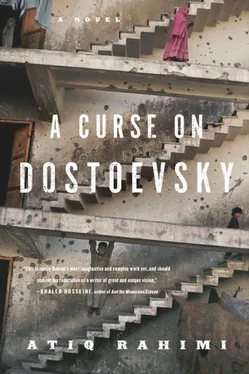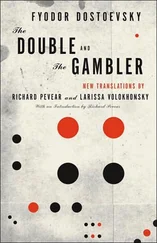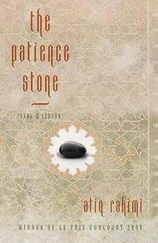Nana Alia can go to hell! I’ve killed her.
He throws his cigarette into the courtyard, opens the gate and runs out into the lane. Sophia, horrified, chases after him. “Rassoul! Do you know what’s happened to Nana Alia?” Don’t try and find out what he’s done to her, Sophia! You will lose him. “What’s the matter? I’ve a right to know.” He stops and stares at her, both oppressed and oppressive. How to tell her that she’ll find out soon enough, that he himself will explain. “Damn! My chador! Hang on, I’ll go back and get it.” She goes. Rassoul continues on his way. After a few steps he stops. The pain in his ankle. He rubs it.
Far away, somewhere in the city, there is a volley of gunshots. He looks up at the Asmai Heights. A group of armed men are climbing to the summit.
He, on the other hand, is going down, toward the saqi-khana where…
SOMEONE IS coughing—a loose, drawn-out cough. Then they spit. Between coughs we hear a voice; a rich, solemn voice belonging to a certain Kaka Sarwar, reciting: “… and thus Dhul-Qarnayn took a new road toward the north. He came to a city located between two mountains, and there he found a people who spoke some isolated language and could understand no other, and who were suffering the oppression of Gog and Magog, two evil tribes drawn from the dregs of society who were ravaging the area.” He stops to inhale a lungful of hash. “Seeing that he was a strong and powerful man, the people asked Dhul-Qarnayn to build a wall between them and the men of Gog and Magog, and offered to give him a handsome tribute in return. Gog and Magog were indeed two wicked and vicious tribes, who would listen to no counsel and feared nothing. As Dhul-Qarnayn was naturally inclined to do good and help the oppressed he immediately agreed to assist this people, but refused any payment in exchange. He said to them: ‘That which my Lord has established in me is better than tribute. Help me therefore with strength and labour and I will build a barrier between you and them .’” Kaka Sarwar pauses again in his tale to gulp some tea. “ Dhul-Qarnayn thus asked the people to bring him blocks of iron, wood, copper, and charcoal. He erected the blocks of iron between the two mountains, and surrounded them with pieces of wood and charcoal. Then he lit the fire, and as soon as it turned into a furnace poured the molten copper on top. And thus Gog and Magog could neither scale nor pierce the wall. When Dhul-Qarnayn had finished, he cried: ‘This is a mercy from my Lord. But when the promise of my Lord comes to pass, He will make it into dust. And the promise of my Lord is true!’”
“Kaka Sarwar, when will this promise come?”
“But it is already come, dear Hakim! It was said that on the day of the apocalypse the hordes of Gog and Magog would make a hole in the barrier, and Allah would allow them to spread over the earth. They would dominate the world and wipe out the human race; then they would condemn Allah to death, by sending arrows up into the sky… Where is the chillum?” It is brought to him. He smokes and asks: “Do you know this passage from the Koran?”
“No.”
“Shame on you! And do you not know either where this city is to be found?”
“No.”
“Shame on you! This city is here, it is Kabul!” A final drag, and he withdraws into a corner. “Kaka Sarwar, don’t leave us with this terrible story! Recite us a poem!” asks a little man sitting next to Rassoul. Eyes closed, Kaka Sarwar sings quietly: “O City Mufti, you go more astray / Than I do, though to wine I do give way; I drink the blood of grapes, you that of men: / Which of us is the more bloodthirsty, pray?”
“Me!” says a voice. There is widespread, hollow laughter. Then silence, languor, dreams… The world is merely a transparent space without substance or weight. In the middle of it all, Rassoul. Swimming. Naked. Innocent. Weightless and delicate. How he loves this state of grace. A beautiful abyss, a poetry of hemp.
“Rassoul! Rassoul!”
Someone is shaking him. He sits up, slowly, opens his eyes, slowly; in his haze, he hears a teenage voice speaking to him.
“Hello. Razmodin sent me. He asked me to find you and take you to the Hotel Metropole. I’ve been looking for you everywhere…” Rassoul gazes at him from the depths of his dream “…I went to your house, and you weren’t there. I went to the late Mohamaramollah’s house…” Please, make him shut up! Rassoul isn’t in the mood to listen to every moment of the search. The boy watches Rassoul light a cigarette and exclaims “It’s a Marlboro!” in a voice full of envy. Rassoul offers him one. The boy hesitates, then takes it and sits down opposite Rassoul. “…Your fiancée told me she had lost you. I went back to your house, and the neighbor sent me here…” OK, OK! Rassoul gestures to show that he has understood. Be quiet now; let him get his head together.
When he comes to his senses, Rassoul glances all around the room and sees only silent, motionless ghosts. “Your cousin nearly died!” Nearly died? Why? asks Rassoul with his eyes, frowning. “A rocket landed just behind the hotel. It caused a lot of damage.” But Razmodin is safe?
Rassoul stands up suddenly and walks out of the smoking den, followed by the young lad. He runs—still limping—all the way to Razmodin’s office, in the basement of the hotel. The door is open. His cousin is busy picking up papers that have scattered all over the floor.
Nothing serious, then.
I can leave.
Yes, leave! Or it will be the same words, the same reproaches, the same temper as this morning… Worse, in fact, because he will see that you’ve been smoking hash.
He is about to leave when Razmodin notices him. He stops gathering his things and rushes to the door. “Where are you going, Rassoul?” Rassoul freezes. “Come in!” Rassoul comes in. “Sit down!” commands Razmodin, pointing to a decrepit sofa. He is febrile, more so than this morning. Something is roiling inside him, troubling him, preventing him from speaking. Time passes. Time spent searching for the right words, words that can make bad news bearable. Rassoul senses this. He knows his cousin, knows his confusion and clumsiness in difficult situations. He waits for him to find the words.
“Rassoul, do you know Commandant Rostam?” Rassoul looks down, pretending to think, and keeps his head down as he shakes it, so as not to give anything away. Of course he knows him. He must be the man his mother mentioned in one of her letters, without giving his name—the one who wants to marry Donia. “He’s come from Mazar, at your mother’s request. He’s upstairs now, waiting for you in the hotel restaurant,” says Razmodin as he paces over to his desk. He returns to whisper the thing that is torturing him: “Cousin, there’s bad news”; he waits, waits for Rassoul to stand up and cry: “What bad news?” But he doesn’t, he just sits there quietly, motionless, avoiding Razmodin’s eyes.
“Rassoul?” Rassoul looks up. “Your father…” He is dead—Rassoul knows that, but can’t say it. And even if he could, he wouldn’t; he’d nod his head, as he is doing now. That’s all.
“He is… dead.” Razmodin finally stutters out the word. Rassoul nods his head again to show that he already knows.
“You knew?” Rassoul mouths “yes” with his eyes on the ground. “You already knew?” repeats Razmodin, stunned. “How did you know? Who told you? When?”
Must I really find a pen and explain all this—how my mother told me a month ago, in a letter that she sent to this very hotel? Come on, Razmodin, you remember: it was you who brought me the letter. Don’t act like an idiot!
No, Razmodin is not an idiot. He has understood everything. The only reason he’s stunned is that he can’t understand why you didn’t tell him. “But cousin, it was your father!” He grabs Rassoul by the arm, outraged. “They killed him! Did you know that?” Few people die a natural death these days, Razmodin. You know my opinion on the subject. So please, spare me this absurd astonishment, this fake surprise… Rather let us remain in this silence, laden as it is with your accusations and my despair.
Читать дальше












